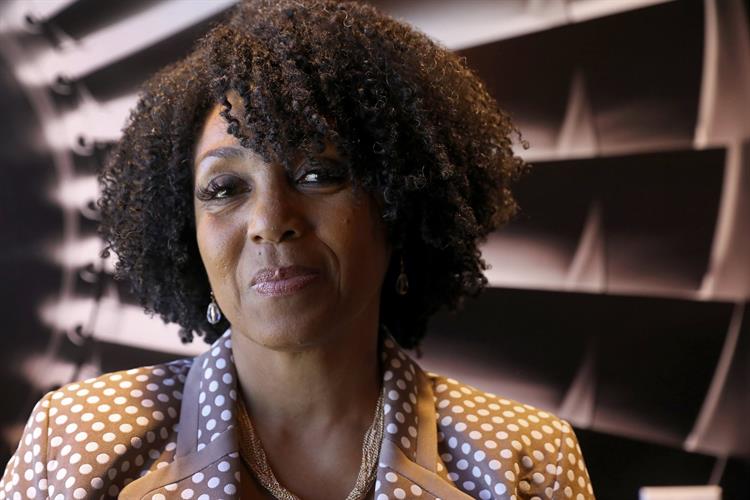A Living Legacy - From One Trailblazer to Another
“As Executive Director Rahr often says, our society needs guardians, not warriors. The culture of law enforcement in Washington has been changing for the better, and so much of that is due to the efforts she has made at the Criminal Justice Training Commission. Her leadership and deep understanding of what it means to be an officer on the ground were crucial in developing the 40-hour Crisis Intervention Training program and in bringing the Active Bystandership for Law Enforcement program to Washington. She doesn’t wait for others to clear the way; she blazes her own path—and she does it with a good sense of humor.” - Senator Manka Dhingra, a King County Senior Deputy Prosecuting Attorney
“I’m excited that the Criminal Justice Training Commission will have the opportunity to benefit from Interim Executive Director Alexander’s leadership. As the first Black woman promoted to sergeant in the Washington State Patrol, she knows a thing or two about breaking new ground. The experience on the ground and understanding of the issues facing law enforcement that she brings to this role will make her a huge asset for our whole state.” - Senator Manka Dhingra, a King County Senior Deputy Prosecuting Attorney
"Three things I will always appreciate about Director Sue Rahr. First was when I became Snohomish County Sheriff in 2008. There was never a time that I called Sheriff Rahr, and she did not return my call immediately. I asked her some difficult questions about some personnel decisions I had to make. Her advice was always spot on. She never, ever tried to sugarcoat things to make me feel good. Second was when she became executive director at the Criminal Justice Training Center (CJTC). Her first speech to a graduating class when she talked about training police officers to become Guardians of their communities instead of Warriors was a game changer for the law enforcement profession in Washington. It remains one of the best graduation speeches I have ever heard. Finally, I called her in June of 2020, shortly after George Floyd was killed because I needed to talk with someone. She pointed out the fact that the law enforcement profession must be willing to be accountable. Director Rahr is the finest leader I have met in my life. And she always leads with that infectious smile." - State Representative John Lovick, 44th District, Snohomish County
“Sue Rahr has been our Angie Dickinson. Tough yet graceful, super smart yet no-nonsense, classy yet gritty, philosophical yet down-to-earth, comfortable meeting with the President at the White House yet even more comfortable having a meal with me at Denny’s. Sue was a highly capable Chief and Sheriff with the perspective of a line officer, understanding what was needed to transform policing from the ground up. Sue understood the need to shatter convention and to be boldly innovative to bring policing into modern times, to uphold the profession, and to draw police closer to the communities they serve, all in the interest of keeping the public safe. It’s been a supreme pleasure working with Sue over the years, and I’m honored to be able to say I know her well.”- State Representative Roger Goodman
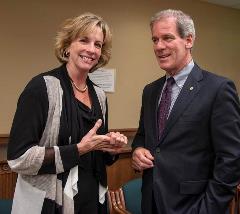
"Sue Rahr has been a strong and consistent advocate for effective and fair policing. She led the change away from a warrior policing mindset to one grounded in guardianship and partnership with the people officers serve. Sue understands the importance of both professional policing and effective policing to prevent crime and to hold offenders accountable. In her retirement, I hope Sue remains active as one of our leading voices advancing the police profession." - Tim Burgess, Former Seattle City Council President and Interim Mayor
"Sue Rahr was a major player on the White House Task Force on 21st Century Policing, bringing insight and vision from her years in law enforcement in Washington State. And on a group composed of very diverse voices, she was an important leavening factor, always bringing her optimism, her energy, and her determination that we could find pathways to consensus. Her passion for improving policing, I am certain, will not wane with retirement. I am convinced we will hear much more from Sue Rahr!"- Professor Laurie Robinson, George Mason University; Co-Chair, White House Task Force on 21st Century Policing (2014 -16)
"At our department’s last advisory committee meeting which was conducted virtually last month, Sue was our featured presenter and she delivered a presentation on work being done at WSCJTC on the new ABLE Training. While she was speaking, in the background there was a sign on the shelf behind her that said “Do Epic Sh*t.” I can’t think of a more apropos mantra for the feelings generated by Sue in any role she takes on. Sue’s work is epic. From the enormous changes she has made at the WSCJTC implementing guardian law enforcement training to her respect for and engagement in academic-practitioner collaboration to conduct research to inform evidence-based practice, to the way she conducts herself in interactions with the community with grace and humility and accessibility, to the fast-paced energy she brings to every project, initiative, and endeavor, Sue Rahr is a force that has taken law enforcement and criminal justice in Washington State to new levels of reform and innovation. In this very difficult time in the history of criminal justice and the social reckoning to address systemic racism and injustice in the ways in which law enforcement engages with the community, Sue Rahr’s work at WSCJTC has laid the groundwork for culture change in policing and criminal justice and offers hope for the next era of law enforcement training, research, and evidence-based practice." - Jacqueline B. Helfgott, PhD, Seattle University Department of Criminal Justice, Professor/Director, Crime & Justice Research Center
“The fact that she is a woman has been brought up – that she’s weak or she’s not as strong. Anybody that ever encountered her when she had a badge and a gun on would not tell you that Sue Rahr was soft on anything.” - Jeffery Robinson, deputy director at the national office of the American Civil Liberties Union.
.jpg?sfvrsn=1f06ee1f_2&MaxWidth=1000&MaxHeight=500&ScaleUp=false&Quality=High&Method=ResizeFitToAreaArguments&Signature=57CEF05FEA742101189804C1A612D59E03F1971A)
When Sue Rahr graduated from the police academy in 1979, she stepped into a career that would not only hone her strength, courage, and insight—but make her a trailblazer for women and men in law enforcement. She says her decades of work at the King County Sheriff’s Office from front-line deputy to Sheriff, was the foundational training for her pioneering leadership as Executive Director at the Washington State Criminal Justice Commission. As she prepares for the “next chapter” her legacy will live on through retired WSP Captain Monica Alexander, a renowned trailblazing law enforcement leader in her own right. Alexander will be stepping up as Interim Executive Director, training the new generation of “guardians of democracy.” This changing of the guard is taking place in midst of a national reckoning about the role of policing in our very divided country. Rahr, who personally recruited Alexander, said “Monica is exactly the right person to carry on this challenging work with the passion and courage to get it done.”
The political climate was calmer forty-two years earlier when Rahr joined the King County Sheriff’s Office at the age of twenty-two, with the goal of saving money for law school. However, by the end of that first year, she was hooked and never looked back. Fiercely independent, she was drawn to the autonomy of the job and the challenge of figuring out, on virtually every dispatched call, how to help people when they need it the most. This was sometimes accomplished during a crisis, other times over weeks or months working with an assortment of community members – a strategy she used long before “community policing” had a name.
There were times when finding solutions to human problems required a deeper commitment. Having the benefit of a stable and secure upbringing, Sue was shocked to learn about the prevalence of domestic violence and sexual assault, especially involving children. This tragic awareness spurred her to become a volunteer in a newly formed domestic violence advocacy program. Later she, a sexual assault counselor and an elementary principal joined forces to create the first-of-its-kind sexual assault awareness program for elementary school children in 1981 - long before the concept of “good touch/bad touch” entered public awareness or public schools. This began a career-long pattern of taking risks to try new ideas and strategies to address crucial social issues.
As part of the first wave of women hired for regular police patrol, Rahr faced challenging issues like “what do you do with a pregnant patrol sergeant?” The Sheriff’s Office and other departments across the state had never had to consider this dilemma when she and her husband were preparing for the arrival of their first son in 1984. She had just been accepted into the prestigious FBI National Academy program for promising leaders and was supervising third shift patrol in White Center. Upon learning of her pregnancy, the FBI rescinded her acceptance to the program, even though she continued to work the street into the fifth month of pregnancy and maintained her rigorous daily workout. At the time, she recalls just being very relieved to have kept her job.
During her 33 years with the Sheriff’s Office, Sue worked a wide variety of assignments, from routine street patrol to undercover narcotics, special assault, internal investigations, and Commander of the Gang Unit. After serving as a precinct commander and contract Police Chief for Shoreline, she was promoted to the Chief of Field Operations in 2000 where she was responsible for all front-line patrol response for the entire county. After nearly five years in that position, she was appointed Sheriff when Dave Reichert was elected to the US Congress. She was elected in 2006 and 2010. Though she had never considered the role of Sheriff during her long career, she embraced the opportunity to influence issues on a larger scale. Shortly after being named, “Elected Official of the Year” by the Municipal League of King County, she was recruited by the Director of the COPS office to participate on a project to instill the principles of “Procedural Justice” into policing. Her work on the project led to an invitation to the “Executive Session on Policing” at the Harvard Kennedy School in 2010.
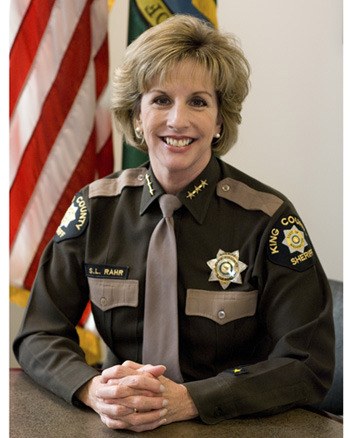
In 2012, she decided to retire from the Sheriff’s Office and accept the position as Executive Director of the Washington State Criminal Justice Training Commission where she could utilize what she’d learned during the previous three decades to train the next generation of cops. She soon realized that before she could effectively implement the principles of procedural justice into the training program, she would first have to address the very militaristic culture that had taken deep root at the academy.
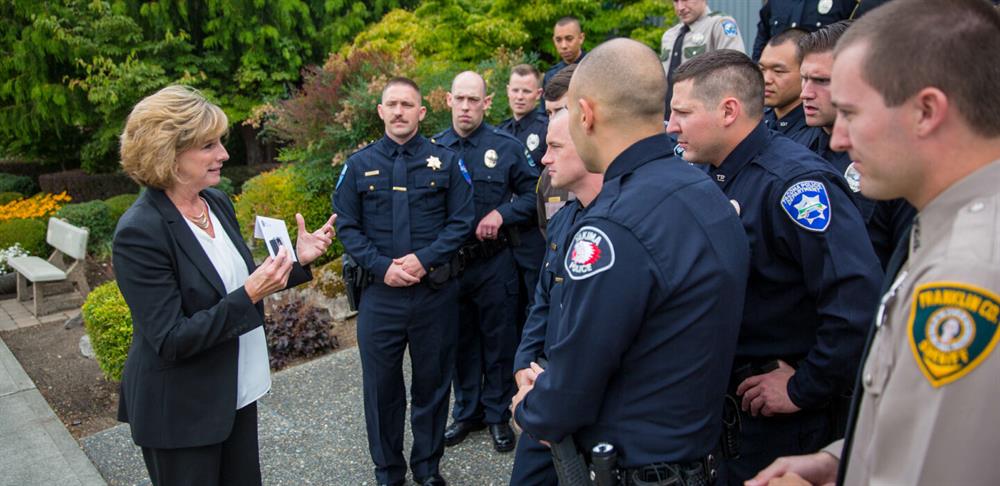
For the next several years she led a team of talented and respected leaders and trainers to demonstrate how culture is purposefully and intentionally built on foundational principles and values. It started with a statement of Plato’s philosophical ideal: “In Republic that honors the core ideals of democracy the greatest amount of power is given to those called the Guardians. Only those with the most impeccable character are chosen to bear the responsibility for protecting the democracy.” (These words are permanently affixed on the front walls of the auditorium.) Symbols and practices were updated to reflect this philosophy - trophy cases were replaced with murals depicting the Constitution and Rahr began presenting personal copies of the Declaration of Independence and Constitution to each recruit. This accompanied a discussion about their role in a democracy and their duty to balance public safety with the protection of civil rights. The practice of snapping to attention was replaced with initiating a respectful conversation; the curriculum was infused with education about human behavior and neuroscience. Patrol tactics emphasized de-escalation and education about empathy and emotional intelligence were presented as fundamental skills for 21st century police officers.
This culture change experiment was so successful that the Harvard Kennedy School and the National Institute of Justice published an academic paper co-authored by Rahr and Seattle University Professor Stephen Rice titled, “From Warriors to Guardians: Recommitting American Police Culture to Democratic Ideals.” This publication and Rahr’s work on procedural justice led to an invitation to become a member of the President’s Task Force on 21st Century Policing, where the first recommendation in the Task Force Report highlights the importance of officers adopting the role of a “guardian” and cites Rahr’s paper about the WA State Criminal Justice Training Commission.
Over the next six years, the term guardian has become part of the modern lexicon of criminal justice reform. Rahr and the work of the Commission has been profiled in many major publications including Time Magazine and the Washington Post. As a member of numerous national criminal justice reform organizations, Rahr is looking forward jumping off the treadmill of running a large and complex organization so she can spend more time thinking, writing, and working creatively to build better police training, with a strong focus on the role of leaders in building culture. She said, “I’ve always had a strong preference for building my own playbook, rather than following the status quo.” The philosophy that has earned her both admiration and contempt will serve her well in her next chapter.
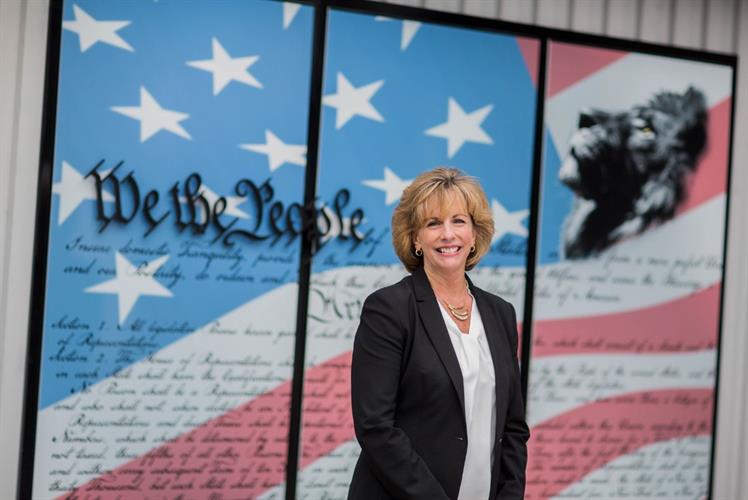
For 9 years, Rahr’s leadership laid the ground-work for the future of policing in Washington state and nationally. During this time, she kept her eye out for a successor who shared her passion, work ethic, and courage to continue the important work. Monica Alexander fit- and exceeded - Rahr’s expectations.
Alexander’s resume is impressive—she retired from Washington State Patrol (WSP) after 23 years of service in August 2019, leaving behind a legacy of deep knowledge, tireless work, and dedication to those she served- and bringing it to WSCJTC as Advanced Training Division Manager in September 2019.
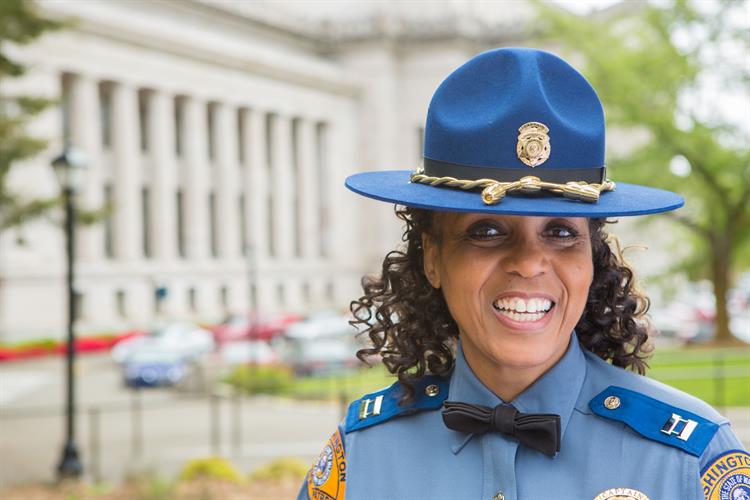
From the start of her career, she has been a trailblazer. Witnessing the LA riots after the beating of Rodney King by LAPD, Monica Alexander was determined to make a difference in policing. As a flight attendant who had previously held a career as a cosmetologist and hair salon owner, she certainly did not come into law enforcement the traditional way. However, the knowledge and people skills she gained from her respective careers led her smoothy into her new career. She knew there had to be ways to forge authentic, positive connections between the police and the public.
After she made her home in Washington State, Alexander joined the Washington State Patrol as a cadet in 1996. At the time, she was a single mom of a three year-old son, who she credits as her inspiration throughout her groundbreaking career. She became the first African American female to be promoted to the rank of Sergeant, and the only African American female to be promoted to Lieutenant and Captain in the history of WSP.
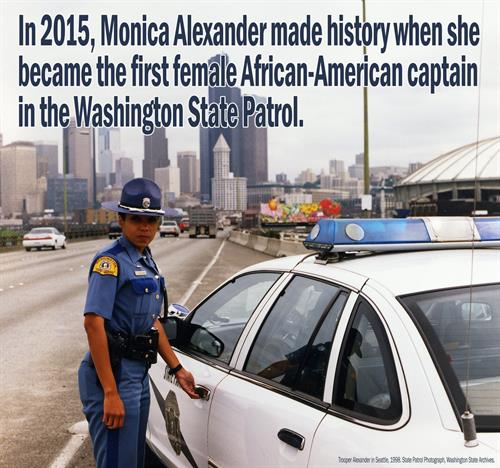
Her accomplishments are extensive. Throughout her time at WSP, she revolutionized communication between the agency and the media. Not only was she a district PIO as a Trooper early in her career, she worked as a traffic reporter for KOMO News from 2000-2006. This resulted in a cultural shift in WSP’s relationship with the public, opening doors for a more engaging and deeper relationship between WSP and the media in a consistent and positive manner.
In 2006, Alexander became the first Sergeant assigned to the Office of Government and Media Relations, where she continued her work as a PIO. She went on to work as a Sergeant in both Field Operations Bureau and the Internal Affairs Office of Professional Standards before being promoted to Lieutenant of Field Operations Bureau in 2013.
In 2015, she was chosen by Chief John Batiste to take on the role of Captain of Government and Media Relations, where she developed and maintained positive and influential relationships with state legislators as well as community partners and organizations. In this role of legislative liaison, she worked with Rep. Tina Orwall to pass 2nd Substitute House Bill 1166, which established a Survivor Bill of Rights, requiring law enforcement to undergo specialized trauma enforced training and prohibits destruction of rape kits— some of which sat untested for decades. Before this, she worked to pass House Bill 2530 which requires the WSP to create and operate a statewide Sexual Assault Kit Tracking System. In 2019, she worked on a bill that effectively funded a new high-throughput lab in Vancouver, WA, which could clear the backlog in two years and all newly submitted kits in 45 days.
In 2019 she also authored the Missing & Murdered Native American Women Report in response to her work with House Bill 2951 sponsored by Rep. Gina Mosbrucker, which included extensive outreach and engagement with the Native American communities. She was also able to secure two tribal liaison positions within WSP.
At Alexander’s retirement in 2019, a number of state representatives were in attendance, including Representatives Tina Orwall, Gina Mosbrucker, Jake Fey, and John Lovick. Governor Jay Inslee’s Senior Policy Advisor Sonja Hallum also read a personalized letter to Captain Alexander from the Governor, recognizing her trailblazing impact on the state of Washington.
“Today a phenomenal public servant, Capt. Monica Alexander of the Washington State Patrol, is retiring,” wrote Governor Jay Inslee. “Capt. Alexander’s leadership, dedication and service have made our state a better place in so many ways. Thank you and best wishes on a well-deserved retirement.”
After leaving WSP, she joined WSCJTC as Advanced Training Division Program Manager, where she has been dedicated to ensuring officers are trained with an understanding of current social and political issues, including facilitating the development of a comprehensive History of Race and Policing class.
Alexander was also recently on the advisory committee of Governor Jay Inslee’s Task Force on Independent Investigations of Police Use of Force, where she provided feedback on current protocol around use of deadly force by law enforcement.
Her commitment to public engagement and building relationships between police and communities is unmatched, which is why current Executive Director Rahr recommended her for the position.
During the January WSCJTC Commissioner’s Meeting, Rahr officially nominated her for the position, where she received full support from the Commission. Alexander will be stepping into this role as interim Executive Director in March 2021.
“Monica’s passion for the future of policing and her courage and hard work to carry it forth is beyond commendable”, said Executive Director Rahr. “She is deeply respected by so many communities—legislative, law enforcement, and the public. I couldn’t ask for a better person to carry this great agency into the future.”
